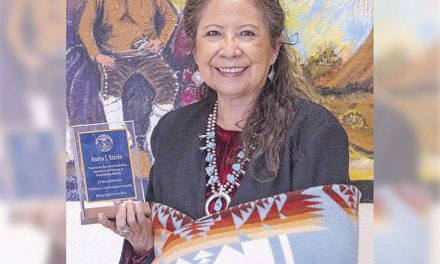
DCD asking chapters for ARPA priorities
WINDOW ROCK
Pearl Yellowman, director of the Division of Community Development, on Tuesday said her department is requesting chapters to submit priorities for American Rescue Plan Act funds, including power lines, water lines, solar, house wiring, bathroom additions, rural addressing and warehouse projects.
“The chapter projects are the anchor for the ARPA and are the veins that run through the Navajo Nation,” Yellowman told delegates at the Naabik’iyati work session. “We’re working with the chapters to solicit projects.”
Chapters may select up to three priority projects to be considered for ARPA funding, which require separate online applications through the web portal at www.nndcd.org.
The application has 50 questions, takes about an hour to complete, and must be filed online by the deadline of 5 p.m. on April 28.
A separate portal for housing applications will be forthcoming, said Yellowman.
“I think we’re in a better position this year to present information and work closely with our chapters,” she said. “We tried to make this process user-friendly.”
Yellowman said that in 2020, DCD had a difficult time coordinating with controller’s office consultant Baker Tilly in processing the chapter requests.
“Information has to be presented in a sincere and understandable way,” she said.
‘Unified messaging’
Yellowman said DCD will be available to provide technical assistance and share additional ARPA guidance and requirements as they are released.
DCD will also vet the requests and prepare a “feasible project listing,” she said.
In 2020, $90 million was allocated to chapters in the Navajo CARES Act Fund Chapter Distribution Expenditure Plan to help cover a long list of COVID-19 relief items – but ultimately chapters lost out on over two-thirds of the funds.
Of the 5,500 requests for chapter expenditures, many were not allowable due to CARES Act restrictions and the short timeframe to spend the funds.
Despite the hard work that the chapters put into submitting their plans to DCD through the Baker Tilly portal last fall, ultimately only $28 million was spent on essential food, personal protective equipment and sanitation supplies for chapters in a bulk order made through the controller’s office.
In December, Controller Pearline Kirk acknowledged that with the former CARES Act deadline of Dec. 31, 2020, the short timeframe to spend the funds caused frustration and challenges among several Navajo Nation divisions, departments and chapters.
Yellowman said with more time to plan for and spend the ARPA funds she is hoping for a better outcome this time around.
Some of the ARPA guidelines are not known yet, but she is expecting that there will be fewer restrictions than there were with the CARES Act.
“We’re anticipating the ARPA will have a little more flexibility to support the Nation’s priorities,” said Yellowman.
She also said her team will have better access to ARPA information and what is feasible under the act with the help of attorneys from Holland and Knight, consultants for the Navajo Department of Justice.
Yellowman agreed that last year was very challenging and difficult because DCD and other divisions were responding to the pandemic while trying to manage and administer CARES Act funds.
“That was a tremendous task and responsibility,” she said.
Yellowman also reminded delegates that COVID-19 exposures among staff and building closures took a toll on operations.
“This year we have some time to put in place stakeholder partnerships and make sure that we have adequate data and information to assist our leaders to make good decisions,” she said.
Yellowman is committed to working with the chapters and agency councils to get their input with regard to ARPA.
“We want a better experience this year and a streamlined approach,” she said.
She also wants to work toward improving communications between DCD, the chapters, Council and the president’s office and appealed to the three branches of government to work together to support that.
“I ask that we really work together on unified messaging to the chapters,” she said. “Not only do we agree that the chapters need to be heard but having them at the table is really important as well. They are the beneficiaries of the ARPA and we support that.”
‘Inundated and overwhelmed’
Yellowman acknowledged that while her department is in a better position to take on the ARPA now, resource and staffing capacity continue to be issues, and there are still limitations due to the ongoing COVID-19 emergency.
“Staffing is a concern,” said Yellowman. “We do need adequate staffing just to meet the workload we have at DCD. Sometimes we’re inundated and overwhelmed.”
As an example, she said the DCD Capital Projects Management Department has only 20 managers who each oversee about 25 projects.
Yet, as was learned through the CARES Act projects, it is possible to move a massive amount of funds and complete projects, she said.
“I believe it’s our role to put a project listing in a strategic plan that makes it possible for projects to be able to get done within 36 months,” said Yellowman, referring to the ARPA deadline of Dec. 31, 2024.
This will also involve bringing on qualified contractors in a timely and efficient manner, she said.
Additional challenges that Yellowman would like to see resolved in administering ARPA funds include: improvements in controller’s office procedures and approval systems, clarification and streamlining of emergency procurement, simplified processes for securing rights of way and clearances, and recognition that administrative costs for resource and staff capacity-building need to be built into project expenditure plans.
“There are industry standards for capital outlay and infrastructure, which require at least a 15% allocated amount to capacity-building,” she said. “All of it comes down to our capacity, which includes a comprehensive approach by multiple divisions to respond to the ARPA funds.”
Uniform project listing
Yellowman outlined the “Chapters ARPA Mobilization Plan,” which will include a comprehensive “organized and uniform listing of projects.”
She said DCD has already begun coordinating with the 110 chapters, five agency councils, the Navajo Nation Council and the president’s office as well as partners like Navajo Tribal Utility Authority, Continental Divide Electric Cooperative, Jemez Mountains Electric Cooperative, the Water Management Branch, Indian Health Service and Navajo Engineering and Construction Authority.
“We’re asking for an all-hands-on-deck approach for helping the chapters with technical assistance,” said Yellowman.
“Specialty projects” such as emergency warehouses to store equipment, supplies and PPE needed to mitigate COVID-19 and to prepare for future emergencies can also be considered for ARPA funding.
Additionally, Yellowman said there are opportunities to supplement shortfalls for capital outlay projects and unfinished CARES projects such as bathroom additions, cisterns, septic and wastewater, rural addressing, and solar projects with the ARPA funds.
Proposed 2021 timeline for Chapter ARPA projects:
- April 28 – DCD ARPA application deadline.
- April 30 – May 4 – Submission of information for curable deficiencies.
- April 30 – Convene rating committee.
- May 4 – Orientation with the rating committee utilizing approved policies and procedures.
- May 5-14 – Conduct ARPA Plan proposal review/ranking using the established and approved evaluation criteria.
- May 18-20 – Summarize results of the infrastructure proposal evaluation and develop the Navajo Nation Capital Improvement Plan andl budget with score ranking.
- June 1 – Prepare 164 review documents.
- June 10 – Prepare legislation for the infrastructure plan for Resources and Development and Budget/Finance committees review.
- June 16 – RDC and B&F committees approval.
- June 25 – Naabik’iyati and Council approval.
Information: arpa@nndcd.org
As a public service, the Navajo Times is making all coverage of the coronavirus pandemic fully available on its website. Please support the Times by subscribing.
How to protect yourself and others.
Why masks work. Which masks are best.
Resources for coronavirus assistance







 Highway 264,
Highway 264, I-40, WB @ Winslow
I-40, WB @ Winslow